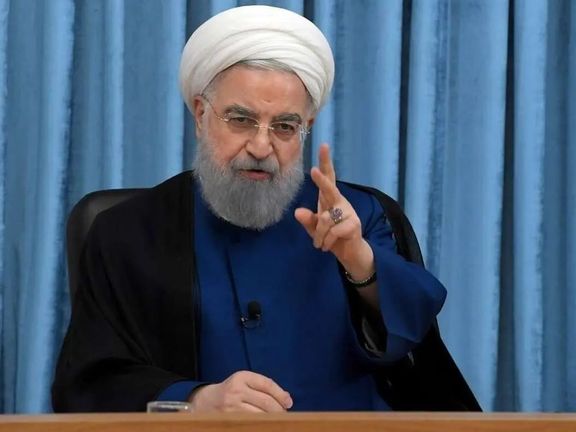Diplomatic concessions and reform needed to forestall war, Rouhani warns

A new military conflict will be inevitable unless Iran regains its national strength through reform, rearmament and realistic diplomacy, former president Hassan Rouhani warned.

A new military conflict will be inevitable unless Iran regains its national strength through reform, rearmament and realistic diplomacy, former president Hassan Rouhani warned.
“Diplomatically, we must reject the dichotomy of war or surrender,” Rouhani said in remarks published on Tuesday.
“We should pursue win-win negotiations, accepting 70–80% gains instead of zero-sum failures that previously resulted in UN resolutions," the former president said.
A key architect of the now mostly lapsed 2015 international nuclear deal, Rouhani is out of favor with Supreme Leader Ali Khamenei and has stepped up calls for reform.
He made the remarks in a meeting on Sunday with his former cabinet members, on the eve of the Middle East Peace Summit in Egypt where US President Donald Trump invited Tehran to join in a new regional order.
The US state department told Iran International on Sunday Washington remains ready for “serious and direct dialogue” with Tehran, hours after Iranian leaders declined invitations to attend the Trump-led summit.
“We are ready to talk directly,” a state department spokesperson said. “Should the Iranians want to negotiate, the ball is in their court."
'Iran attacked when deterrence was gone'
Rouhani called for the Islamic Republic to boost its military and intelligence power while engaging in negotiations in order to avert a war.
“If we strengthen our military, intelligence, political, and diplomatic power—and above all, our national power—there will be no war,” Rouhani said.
"If deterrence exists, there will be no war. War will only happen when deterrence is called into question; otherwise, Israel has always wanted to fight us—it’s not as if it just decided to do so now."
Israel launched a surprise military offensive in June, striking Iran’s military and nuclear facilities as well as targeting top officials. Iran retaliated with salvos of drones and ballistic missiles.
The United States entered the conflict on June 22 with attacks on key nuclear sites in Natanz, Fordow, and Isfahan, and later brokered a ceasefire between Iran and Israel after 12 days of fighting on June 24.
Iranian authorities intensified crackdowns following the conflict, claiming to have disrupted espionage networks and detained alleged spies.
“If you arrest ten top Mossad agents in the country, and the enemy realizes their key operatives are captured, their plans will be disrupted, forcing a redesign that could take months,” Rouhani said.
“More than three and a half months have passed since the 12-day war. We had - and we still have - an opportunity to act to achieve results that delay or even prevent another war."
Since late September when UN sanctions were reimposed on Iran, many observers and Iranian officials have warned of a potential new military conflict with Israel or its allies.
However, Russian President Vladimir Putin said earlier this month that Israel currently has no interest in going to war with Iran.
“We continue our trusted contacts with Israel and are receiving signals from the Israeli leadership asking us to convey to our Iranian friends that Israel is focused on achieving further stability and is not interested in any form of confrontation,” Putin said, according to the Tass news agency.